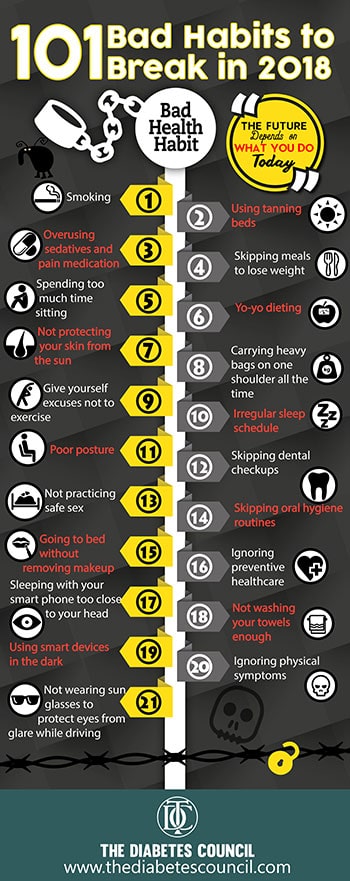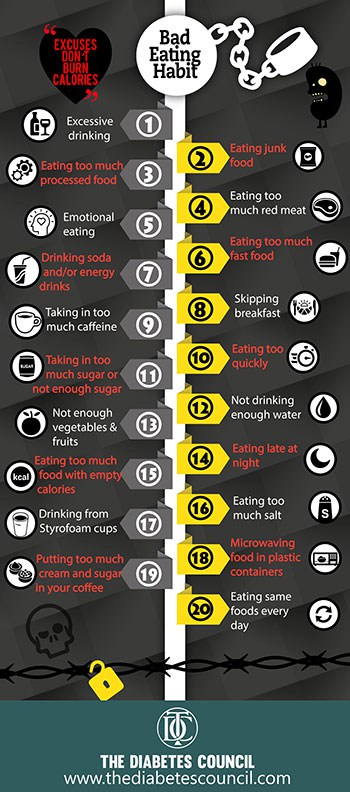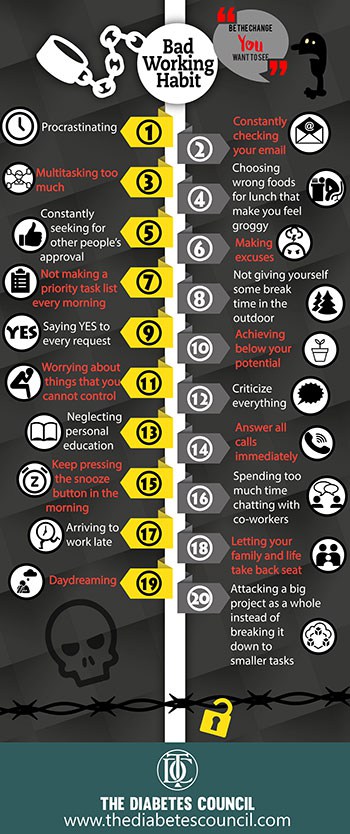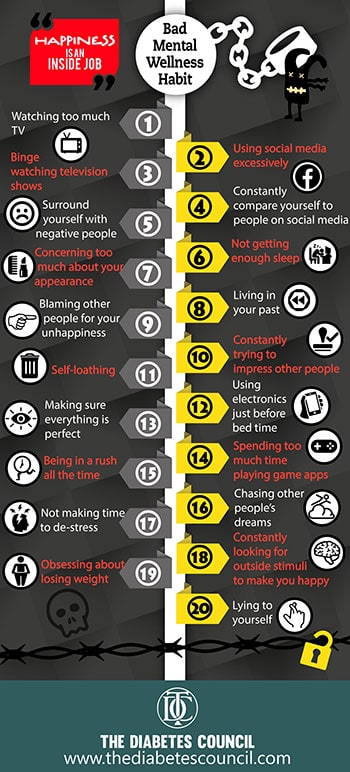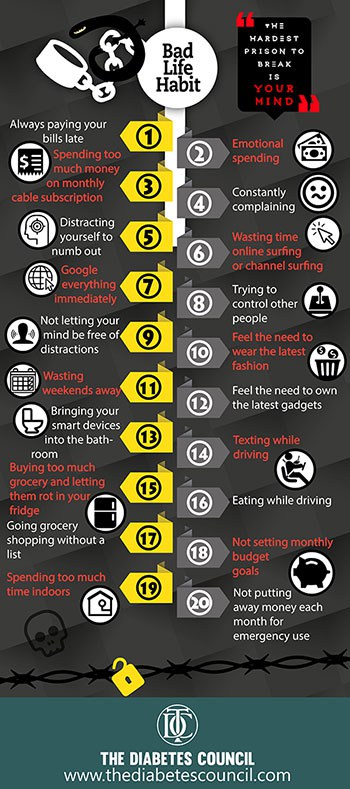
If you feel that you are not reaching your goals or achieving your potentials in life, you may want to take a look at your daily habits. Everyone has their own great habits and bad habits.
The good ones help you to be more productive and energized, whereas the bad ones rob you of your focus, time, and health. For some people, they can immediately pinpoint to a bad habit they wish to change.
For others, they may need a little bit of help to recognize their bad habits. This article is here to help you identify some of the most common bad habits that deprive you from living a fulfilling life.
Types of Habits
Contents
Health Habits
For many people, health-related habits can often be overlooked because bad habits usually do not manifest as physical symptoms until later in life in form of diseases such as diabetes, heart problems, cancer, and organ failures. But the truth is many immediate symptoms can already surface within a short time. Some of the most common signs are:
- general sense of fatigue
- problems with focusing and problem-solving skills
- slow metabolism
- moodiness and other mood problems
- bad-breath
- bad body odor
- prone to infections
- slow healing process
- aching muscles
- skin problems such as acne, rosacea, rash, and/or mole growth
- skin discoloration
- decrease in physical endurance
If this sounds like you, you may want to take a look at this list of bad health habits and see if you may be committing any these harmful behaviors:
- Smoking
- Using tanning beds
- Overusing sedatives and pain medication
- Skipping meals to lose weight
- Spending too much time sitting
- Yo-yo dieting
- Not protecting your skin from the sun
- Carrying heavy bags on one shoulder all the time
- Give yourself excuses not to exercise
- Irregular sleeping schedule
- Poor posture
- Skipping dental checkups
- Not practicing safe sex
- Skipping oral hygiene routines
- Going to bed without removing makeup
- Ignoring preventive healthcare
- Sleeping with your smartphone too close to your head
- Not washing your towels enough
- Using smart devices in the dark
- Ignoring physical symptoms
- Not wearing sunglasses to protect eyes from glare while driving
I recommend reading the following articles:
Eating Habits
You are what you eat. If you are having trouble losing weight and becoming fit, taking a look at the type of food you eat on a regular basis can help you pinpoint your problems. For individuals who are constantly consuming food choices that are high in calories and low in nutritional values, they are more likely to feel tired and lethargic than individuals who choose options that are high in nutritional values and lower in calories. To make things worse, many people may try to overcome the energy problem by drinking excessive amount of caffeinated drinks. Although it may work for short duration of time, it will eventually lose its effects. Consequently, these individuals will end up jittery, cranky, and exhausted.
As food has a direct relationship with blood glucose level, nutrients, and hormones, it plays a large role in both your physical and mental health. For example, a diet completely devoid of sugar can cause a number of symptoms such as brain fog, mood swings, bad breath, fatigue, and sleeping problems (for more information on this topic, please refer to the article). Consuming food that is contaminated with chemicals such as preservatives, artificial chemicals that mimic estrogen-functioning, and other harmful substances can also affect the body in a big way. As recent research studies have found, certain plastic containers release chemicals (e.g. Bisphenol A) that affect the endocrine system, and cause various physical and psychological symptoms. For example, individuals may exhibit lowered testosterone level, breast tissue growth, and lowered metabolism when exposed to these chemicals over a duration of time. Other long-term physical symptoms can be hormonal imbalance, diabetes, obesity, male reproductive dysfunction, fetal development issues, high blood pressure, vitamin D deficiency, and cavities.
If you are wondering where you should start changing your diet to start feeling and looking better, here is a list of the most common bad eating habits:
- Excessive drinking
- Eating junk food
- Eating too much processed food
- Eating too much red meat
- Emotional eating
- Eating too much fast food
- Drinking soda and/or energy drinks
- Skipping breakfast
- Taking in too much caffeine
- Eating too quickly
- Taking in too much sugar or not enough sugar
- Not drinking enough water
- Not eating enough vegetables and fruits
- Eating late at night
- Eating too much food with empty calories
- Eating too much salt
- Drinking from Styrofoam cups
- Microwaving food in plastic containers
- Putting too much cream and sugar in your coffee
- Eating same foods every day
Work Habits
Many people feel stuck in their current job positions. The days never seem to have enough hours and projects seem to be too complicated to be accomplished within the given deadline. So how can you give your work habit an overhaul to maximize your productivity and results? What can you do to achieve more within shorter amount of time? How can you free up your headspace and reserve your energy for things that truly matter in the working environment? The answer of these questions all come down to your work habits and how you tackle your day. Here is a list of the most common unhealthy practices many individuals commit in the workplace:
- Procrastinating
- Constantly checking your email
- Multitasking too much
- Choosing wrong foods for lunch that make you feel groggy and tired afterwards
- Constantly seeking for other people’s approval
- Making excuses
- Not making a priority task list every morning
- Not giving yourself some break time in the outdoor
- Saying YES to every request
- Achieving below your potential
- Worrying about things that you cannot control
- Criticize everything
- Neglecting personal education
- Answer all calls immediately
- Keep pressing the snooze button in the morning
- Spending too much time chatting with co-workers
- Arriving to work late
- Letting your family and life take back seat
- Daydreaming
- Attacking a big project as a whole instead of breaking it down to smaller tasks
Mental Wellness Habits
It seems that a lot of people are seeking ways to achieve a sense of happiness and peace from external sources. But as many self-help gurus and psychologists say, true happiness and peace can only be achieved from within. The happiness from external stimuli can only keep you preoccupied for a certain duration of time before its effects wear off. The aftermath is a sense of boredom, anxiety, and depression. On the other hand, internally triggered happiness is a much subtle yet powerful feeling. It enables you to reach a sense of harmony and positivity. The question is how do you accomplish this goal?
Instead of thinking about reaching this goal as a one step process, this ultimate objective can be broken down into smaller subdivisions of your life balance. Aside from paying attention to your health and attaining your work/life balance, you should also work on minimizing your mental stress and distraction. At the same time, you should strive to cut down external stimuli and spend time working on your personal development. Here is a list of most 20 common mental health sabotage habits to quit:
- Watching too much TV
- Surround yourself with negative people
- Using social media excessively
- Constantly compare yourself to people on social media
- Binge watching television shows
- Not getting enough sleep
- Concerning too much about your appearance
- Living in your past
- Blaming other people for your unhappiness
- Constantly trying to impress other people
- Self-loathing
- Using electronics just before bed time
- Making sure everything is perfect
- Spending too much time playing game apps
- Being in a rush all the time
- Chasing after other people’s dreams
- Not making time to de-stress
- Constantly looking for outside stimuli to make you happy
- Obsessing about losing weight
- Lying to yourself
Life Habits
In our society, people always complain that they are so bogged down by life and over-stressed about their current living situation. After work, there is never enough time to work on their hobbies or spend time with their love ones. No matter how much time and energy they spend on fixing their physical and mental health, they never seem to shake that anxiety. These two common problems can be boiled down to your daily life habits. Here is a list of most common bad life habits:
- Always paying your bills late
- Emotional spending
- Spending too much money on monthly cable subscription
- Constantly complaining
- Distracting yourself to numb out negative emotions
- Wasting time online surfing or channel surfing
- Google everything immediately
- Trying to control other people
- Not letting your mind be free of distractions
- Feel the need to wear the latest fashion
- Feel the need to own the latest gadgets
- Wasting weekends away
- Bringing your smart devices into the bathroom
- Texting while driving
- Eating while driving
- Buying too much grocery and letting them rot in your fridge
- Going grocery shopping without a list
- Not setting monthly budget goals
- Not putting away money each month for emergency use
- Spending too much time indoors
So Now What Should I Do?
Now that you have identify some of your bad habits, what should you do about it? Many people would jump to the conclusion that they have to kill off all these undesirable behavior all at once. The problem is that human thrive on regularity. By making all these changes at the same time, you are setting yourself up for failure. So how can you successfully condition yourself to better habits? Here are some tips to help you:
- Make a priority list of all the bad habits you wish to change. Start from the easiest to the hardest.
- Identify the triggers to your bad habits and write down the desirable habits you wish to achieve.
- Work on changing one habit at a time. In the beginning, take smaller steps and make one change at a time. And as your better habits accumulate and your willpower becomes stronger, you can experiment with two habits at a time.
- Give yourself at least 21 days to change each habit. According to psychology and behavioral science research, a person requires approximately 21 days to break an old habit and turn a new habit into their regular routine.
- Write down the habit you wish to change every morning before doing anything else. By ingraining the new habit into your mind, you are most likely to keep yourself on track.
- Keep a journal of your progress. By writing down your daily progress and seeing yourself doing better, you are psychologically boosting your confidence of achieving your goal.
- If you fail to accomplish your new habit for a day, do not beat yourself up. Take a moment to analyze the triggers that lead to the problem, and come up with ways to combat this situation in the future. By taking a positive problem-solving approach, you are much more likely to succeed.
- Get your friends and family involve. Having your love ones support you will greatly help when you need a moment to regroup.
- Ask for professional help. If you are struggling with a certain habit and wish to break it off, consider seeking assistance from community help groups or professional help.
- Reward yourself for every accomplishment. Positive feedback is the best way to boost your motivation and ingrain your new habit into your mind. Remember that rewards that are tied to your goals are much more powerful than immediate happiness triggers.
Further reading:
Conclusion
To err is human. We all make bad choices and habits at some point in our lives. But by identifying where we went wrong, we can learn to become healthier and happier version of ourselves. Just by reading this article, you have taken a first step to reaching this goal. We understand that the journey to self-exploration can be difficult, and we sincerely wish to hear from you about your tips on conquering your bad habits. If you have any personal stories you wish to share with other readers, feel free to write them in our comment area. If you also have any suggestions let us know!
TheDiabetesCouncil Article | Reviewed by Dr. Sergii Vasyliuk MD on May 28, 2020


